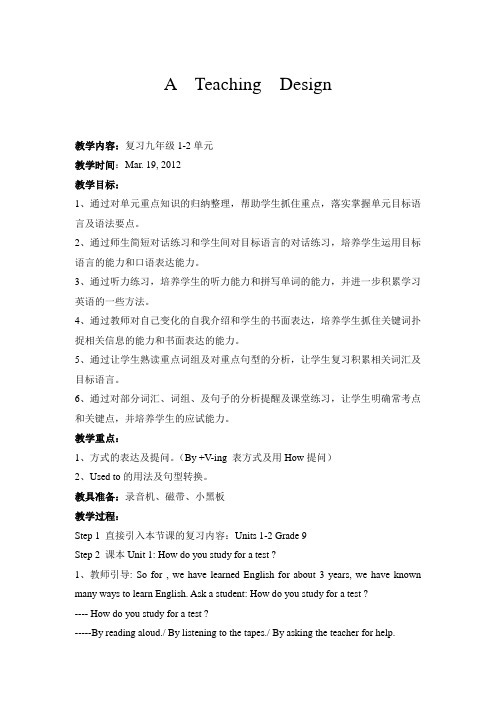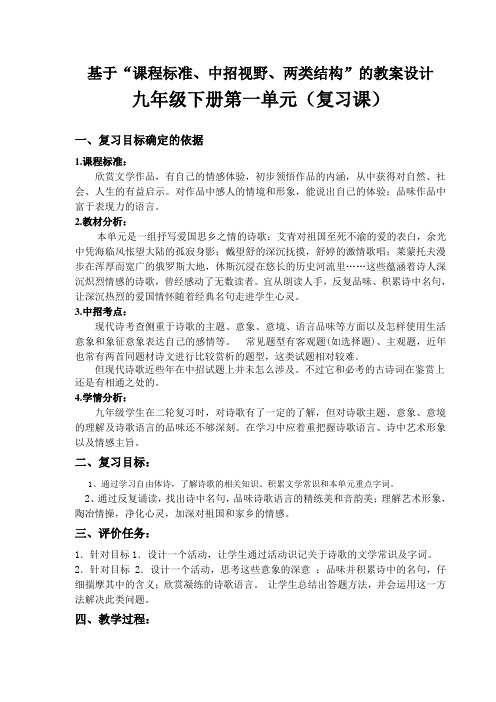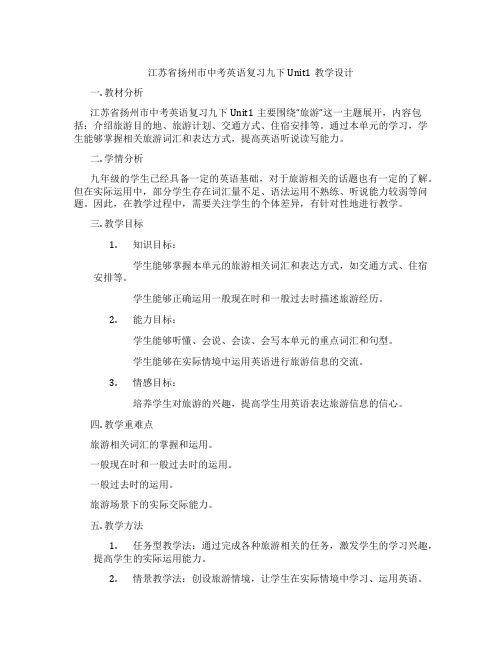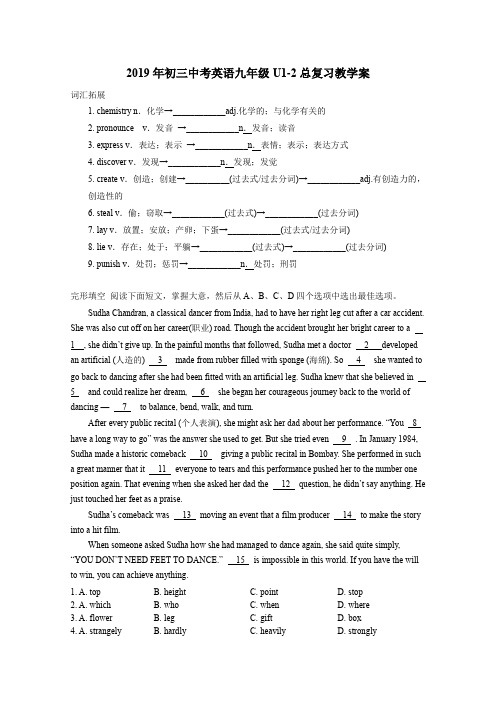中考总复习教案板式九年级下Unit1--2
- 格式:doc
- 大小:72.50 KB
- 文档页数:6


A Teaching Design教学内容:复习九年级1-2单元教学时间:Mar. 19, 2012教学目标:1、通过对单元重点知识的归纳整理,帮助学生抓住重点,落实掌握单元目标语言及语法要点。
2、通过师生简短对话练习和学生间对目标语言的对话练习,培养学生运用目标语言的能力和口语表达能力。
3、通过听力练习,培养学生的听力能力和拼写单词的能力,并进一步积累学习英语的一些方法。
4、通过教师对自己变化的自我介绍和学生的书面表达,培养学生抓住关键词扑捉相关信息的能力和书面表达的能力。
5、通过让学生熟读重点词组及对重点句型的分析,让学生复习积累相关词汇及目标语言。
6、通过对部分词汇、词组、及句子的分析提醒及课堂练习,让学生明确常考点和关键点,并培养学生的应试能力。
教学重点:1、方式的表达及提问。
(By +V-ing 表方式及用How提问)2、Used to的用法及句型转换。
教具准备:录音机、磁带、小黑板教学过程:Step 1 直接引入本节课的复习内容:Units 1-2 Grade 9Step 2 课本Unit 1: How do you study for a test ?1、教师引导: So for , we have learned English for about 3 years, we have known many ways to learn English. Ask a student: How do you study for a test ?---- How do you study for a test ?-----By reading aloud./ By listening to the tapes./ By asking the teacher for help.2、let students read 1a together.3. Ask and answer.T: How do you study for a test ?S: By reading aloud.T: Do you ever study by -----?S: Y es , I do .T: Have you ever asked-------?S: Y es, I have.4. Let students make conversations in pairs.5. Have a listening practice. (Show a small blackboard )Step 3 课本Unit 2: I used to be afraid of the dark.1.教师引导:In the last 30 years ,many great changes have taken place in our county. And in our school, great changes are taking place now. I think people sure change. Do you think so ?2. Shoe a small blackboard and introduce myself to class: How I have changed ?3. let students write the article: How my English teacher has changed ?4. Ask a student to read his/her article.5. Check the answer. Show another small blackboard, let students read the article together.6. 归纳整理:1)主语+used to +v(原) “过去常常,而现在不这样”Did +主语+use to + v(原) (一般问句)主语+didn’t +use to + v(原) (否定句)2)be used to + v(原): 被用来做-----3) be /get used to +n/v-ing : 习惯于(做)某事。

基于“课程标准、中招视野、两类结构”的教案设计九年级下册第一单元(复习课)一、复习目标确定的依据1.课程标准:欣赏文学作品,有自己的情感体验,初步领悟作品的内涵,从中获得对自然、社会、人生的有益启示。
对作品中感人的情境和形象,能说出自己的体验;品味作品中富于表现力的语言。
2.教材分析:本单元是一组抒写爱国思乡之情的诗歌:艾青对祖国至死不渝的爱的表白,余光中凭海临风怅望大陆的孤寂身影;戴望舒的深沉抚摸,舒婷的激情歌唱;莱蒙托夫漫步在浑厚而宽广的俄罗斯大地,休斯沉浸在悠长的历史河流里……这些蕴涵着诗人深沉炽烈情感的诗歌,曾经感动了无数读者。
宜从朗读人手,反复品味、积累诗中名句,让深沉热烈的爱国情怀随着经典名句走进学生心灵。
3.中招考点:现代诗考查侧重于诗歌的主题、意象、意境、语言品味等方面以及怎样使用生活意象和象征意象表达自己的感情等。
常见题型有客观题(如选择题)、主观题,近年也常有两首同题材诗文进行比较赏析的题型,这类试题相对较难。
但现代诗歌近些年在中招试题上并未怎么涉及。
不过它和必考的古诗词在鉴赏上还是有相通之处的。
4.学情分析:九年级学生在二轮复习时,对诗歌有了一定的了解,但对诗歌主题、意象、意境的理解及诗歌语言的品味还不够深刻。
在学习中应着重把握诗歌语言、诗中艺术形象以及情感主旨。
二、复习目标:1、通过学习自由体诗,了解诗歌的相关知识。
积累文学常识和本单元重点字词。
2、通过反复诵读,找出诗中名句,品味诗歌语言的精练美和音韵美;理解艺术形象,陶冶情操,净化心灵,加深对祖国和家乡的情感。
三、评价任务:1.针对目标1.设计一个活动,让学生通过活动识记关于诗歌的文学常识及字词。
2.针对目标2.设计一个活动,思考这些意象的深意;品味并积累诗中的名句,仔细揣摩其中的含义;欣赏凝练的诗歌语言。
让学生总结出答题方法,并会运用这一方法解决此类问题。
四、教学过程:复习目标教学活动评价要点要点归纳复习指导(一):内容:九年级下册第一单元方法:独学、对学、交流、展示、教师点拨、找出规律,归纳方法要点。

江苏省扬州市中考英语复习九下Unit1教学设计一. 教材分析江苏省扬州市中考英语复习九下Unit1主要围绕“旅游”这一主题展开,内容包括:介绍旅游目的地、旅游计划、交通方式、住宿安排等。
通过本单元的学习,学生能够掌握相关旅游词汇和表达方式,提高英语听说读写能力。
二. 学情分析九年级的学生已经具备一定的英语基础,对于旅游相关的话题也有一定的了解。
但在实际运用中,部分学生存在词汇量不足、语法运用不熟练、听说能力较弱等问题。
因此,在教学过程中,需要关注学生的个体差异,有针对性地进行教学。
三. 教学目标1.知识目标:学生能够掌握本单元的旅游相关词汇和表达方式,如交通方式、住宿安排等。
学生能够正确运用一般现在时和一般过去时描述旅游经历。
2.能力目标:学生能够听懂、会说、会读、会写本单元的重点词汇和句型。
学生能够在实际情境中运用英语进行旅游信息的交流。
3.情感目标:培养学生对旅游的兴趣,提高学生用英语表达旅游信息的信心。
四. 教学重难点旅游相关词汇的掌握和运用。
一般现在时和一般过去时的运用。
一般过去时的运用。
旅游场景下的实际交际能力。
五. 教学方法1.任务型教学法:通过完成各种旅游相关的任务,激发学生的学习兴趣,提高学生的实际运用能力。
2.情景教学法:创设旅游情境,让学生在实际情境中学习、运用英语。
3.交际法:鼓励学生积极参与课堂交际活动,提高学生的听说能力。
4.小组合作学习:培养学生团队合作精神,提高学生的自主学习能力。
六. 教学准备1.教材:九下英语教材。
2.课件:制作与旅游相关的课件,包括图片、视频等。
3.练习题:准备一些与旅游相关的练习题,用于巩固所学知识。
4.教学工具:录音机、投影仪等。
七. 教学过程1.导入(5分钟)利用图片或视频展示不同的旅游目的地,引导学生谈论自己最喜欢的旅游目的地,从而引入本课主题。
2.呈现(10分钟)呈现本课的重点词汇和句型,如交通方式、住宿安排等,并用图片或实物进行辅助教学。

九年级英语全册教案Unit1-Unit2作为一名为他人授业解惑的教育工作者,有必要进行细致的教案准备工作,教案是教学活动的依据,有着重要的地位。
来参考自己需要的教案吧!九年级英语教案1Unit1SmileandSayHello一、教学内容:Unit1SmileandSayHello二、教学目标知识目标:熟练掌握本单元课文中的单词,短语和句型。
能力目标:培养学生的综合运用知识的能力。
三、教学难点:培养学生的综合能力四、本单元重点知识:单词:本单元所有单词(单词表中)短语:1.takeplace发生2.liveupstairs住楼上3.beafraidof害怕……4.keepsb.fromdoingsth.阻止某人做某事5.openone’sheart敞开心扉6.theanswerstothesequestions问题的答案7.walkwithhisheaddown低头走路8.lookawayfromothers把视线从别人身上移走9.pretendtodosth假装做某事10.doone’sbesttodosth.竭尽全力做某事11.withasmile微笑着12.smileatsb.冲某人微笑13.thewindowoftheheart心灵之窗14.raiseyourhead抬起头15.aslongas只要16.aswellas还,而且17.giveyourwarmhandstothem向他们伸出温暖之手祝你好运19.lookintosb.正视,直视某人20.haveagoodtime过得愉快21.BeijingForeignLanguageSchool北京外国语学校重点句型:1.BoththespeakersarestudyinghistoryattheUniversityofCalifornia.两位演讲者在加州大学学习历史。
2.AnnRoylorworksforachildren’smagazineandsheisinterestedinchildeducation.安为儿童杂志工作并且她对儿童教育感兴趣。

2019年初三中考英语九年级U1-2总复习教学案词汇拓展1. chemistry n.化学→____________adj.化学的;与化学有关的2. pronounce v.发音→____________n.发音;读音3. express v.表达;表示→____________n.表情;表示;表达方式4. discover v.发现→____________n.发现;发觉5. create v.创造;创建→__________(过去式/过去分词)→____________adj.有创造力的,创造性的6. steal v.偷;窃取→____________(过去式)→____________(过去分词)7. lay v.放置;安放;产卵;下蛋→____________(过去式/过去分词)8. lie v.存在;处于;平躺→____________(过去式)→____________(过去分词)9. punish v.处罚;惩罚→____________n.处罚;刑罚完形填空阅读下面短文,掌握大意,然后从A、B、C、D四个选项中选出最佳选项。
Sudha Chandran, a classical dancer from India, had to have her right leg cut after a car accident. She was also cut off on her career(职业) road. Though the accident brought her bright career to a1 , she didn’t give up. In the painful months that followed, Sudha met a doctor2 developed an artificial (人造的)3 made from rubber filled with sponge (海绵). So4 she wanted to go back to dancing after she had been fitted with an artificial leg. Sudha knew that she believed in5 and could realize her dream,6 she began her courageous journey back to the world of dancing —7 to balance, bend, walk, and turn.After every public recital (个人表演), she might ask her dad about her performance. “You 8 have a long way to go” was the answer she used to get. But she tried even 9 . In January 1984, Sudha made a historic comeback 10 giving a public recital in Bombay. She performed in such a great manner that it 11 everyone to tears and this performance pushed her to the number one position again. That evening when she asked her dad the 12 question, he didn’t say anything. He just touched her feet as a praise.Sudha’s com eback was 13 moving an event that a film producer 14 to make the story into a hit film.When someone asked Sudha how she had managed to dance again, she said quite simply, “YOU DON’T NEED FEET TO DANCE.” 15 is impossible in this world. If you have the will to win, you can achieve anything.1. A. top B. height C. point D. stop2. A. which B. who C. when D. where3. A. flower B. leg C. gift D. box4. A. strangely B. hardly C. heavily D. strongly5. A. the doctor B. the stage C. herself D. her dad6. A. though B. even C. so D. but7. A. stopping B. remembering C. wanting D. learning8. A. still B. yet C. also D. ever9. A. harder B. easier C. earlier D. faster10. A. as B. with C. by D. for11. A. made B. moved C. let D. forced12. A. same B. new C. different D. interesting13. A. such B. this C. very D. so14. A. allowed B. decided C. pretended D. refused15. A. Nothing B. Anything C. Something D. Everything阅读理解AWhen you’re curious (好奇)about something, and want to know more about it, you can use the way of asking questions. Asking questions is the first step to make discoveries and find interesting answers. The steps below can guide you during the research (研究).Step 1 On a notecard or piece of paper, write down the subject that you are interested in. Just get the main idea down. For example, you might write: Discover more about dinosaurs.Step 2 Next, stop and think for a moment about what you already know about your subject. List what you already know like the sentences below:(1)Dinosaurs lived long before human beings appeared.(2)Dinosaurs lived on the earth for more than 150 million years.(3)Some dinosaurs fed on plants, some on meat.Step 3 What can you do with what you want to learn? By asking questions. On your paper, start writing down questions about the dinosaurs as you think of them:(1)What’s the best weather for dinosaurs to live in?(2)How many kinds of dinosaurs are there?(3)Have dinosaurs really disappeared?Step 4 Armed with your list of questions, you can now go to the nearest library or computer to begin your research. As you learn more about your subject, you’ll probably discover some new questions. For example, you might discover that dinosaurs disappeared about 65 million years ago. Why? What happened? Asking new questions can help you research your subject more widely.The next time you find something interesting to research, take time to organize (组织)your thinking by asking good questions. And remember — learning more always brings more questions.1.When you do some research, you should take the following steps: .① list what you want to know ② choose a research subject③ list what you already know ④ discover new problemsA.④③①②B.①④③②C.②③①④D.③②④①2.From the passage, we know .A.dinosaurs appeared after human beings B.not all the dinosaurs fed on meat C.dinosaurs lived on the earth for 65 million years D.dinosaurs liked warm seasons 3.What does “Armed with your list of questions” mean?A.Putting your list of questions under your armB.Discussing your questions with your classmatesC.Writing down your list of questionsD.Taking your list of questions with you4.According to the passage, which one is true?A.You can find all the answers onlineB.Learn more, and you’ll have no questionsC.Asking questions is the only way for researchD.During the research, you may keep finding new questions5.The best title for this passage is “”.A.Discovering Dinosaurs B.Asking Good QuestionsC.Finding Subjects D.Learning StepsBHow to Be a Better StudentMaybe you are a common student. You probably think you will never be a top student. This is not necessary so, however. Anyone can become a better student if he or she wants to. Here's how: Plan your time carefully. When you plan your week, you should make a list of things that you have to do. After making this list, you should make a schedule of your time. First set your time for eating, sleeping, dressing, etc. Then decide a good, regular time for studying. Don't forget to set aside enough time for entertainment. A weekly schedule may not solve all your problems, but it will force you to realize what is happening to your time.Find a good place to study. Look around the house for a good study area. Keep this space,which may be a desk or simply a corner of your room, free of everything but study materials. No games, radios, or television! When you sit down to study, concentrate on the subject.Make good use of your time in class. Take advantage of class time to listen to everything the teachers say. Really listening in class means less work later. Taking notes will help you remember what the teacher says.Study regularly. When you get home from school, go over your notes, review the important points that your teacher is going to discuss the next day, read that material. This will help you understand the next class. If you do these things regularly, the material will become more meaningful, and you will remember it longer.Develop a good attitude about tests. The purpose of a test is to show what you have learned about a subject. They help you remember your new knowledge. The world won't end if you don't pass a test, so don’t be over worried.There are other methods that might help you with your studying. You will probably discover them after you have tried these.1.The writer gives you ______ methods to help you in the passage.A. Four.B. Five.C. Six.D. Seven.2.What should you do if you want to plan your time?A. Make a schedule of your time.B. Find a good study area.C. Take advantage of class time.D. Review the important points.3. How can we remember what the teacher says?A. By taking notes in class.B. By concentrating on the subject.C. By listening to everything.D. By discussing with your classmates.4. What is the purpose of a test according to the writer?A. To help you solve some problems.B. To make us become better students.C. To discover if you are interested in a subjectD. To show what you have learned about a subject.CI shook hands with my father in the truck, and for a long time he looked straight ahead and didn't say a word. But I knew he was going to say a little t o me. "I can't tell anything," he finally said. "I never went to college, and none of your brothers went to college. I can't say don't do this and do that,because everything is different and I don't know what is going to come up. I can't help much with money either, but I think things will work out. "He gave me a new check-book. "If things get pushing, write a small check. But when you write one, send me a letter and let me know how much. There are some things we can always sell." In four years all t he checks I wrote were less than a thousand dollars. My part-time jobs such as reading to the blind student and sitting with the teachers' kids filled in the financial gaps."You know what you want to be, and they'll tell you what to take," my father went on. "When you get a job, be sure it's honest, and work hard." I knew that soon I would be alone in the big town, and I would be missing the cool winds and a life where your thinking was done for you.Then my dad reached down beside his seat and brought the old, broken Bible that he had read so often, the one he used when he wanted to look something up in a friendly quarrel with one of the neighbours. I knew he would miss it. I knew, though, that I must take it.He didn't say read this every morning. He just said, "This can help you if you will let it."Did it help? I got through college without being a burden on the family. I have been able to make money since.1. What is the writer's main purpose (目的) in writing this passage?A. To tell the readers his life story.B. To tell people what kind of person his father was.C. To let people know how poor he was.D. To tell the readers what present he got from his father.2. Why did the father not ask his son not to do this and do that?A. Because he felt quite confident of his son.B. Because he was born from a poor family.C. Because he was a man of few words.D. Because he didn't want to be much too strict with his son.3. What would someone learn from this passage?A. How to live by oneself.B. How to stand on one's own feet.C. What a good father should do.D. What the self-important is like.4. What may be the proper Chinese for the underlined part in the passage?A. 闲暇时光.B. 学费.C. 经济不足.D. 精神空虚.5. What kind of book did the Bible seem to be to the writer's father?A. It was a book which told you how you should get on well with others.B. There were many good examples for you to copy in it.C. It was a book that told you how to get a good job and a good future.D. It was a good book that could help you when you were in trouble.任务型阅读阅读短文,根据短文内容回答问题。
人教版中考英语一轮复习第十四讲九年级Units 1-2教学设计一. 教材分析人教版中考英语九年级 Units 1-2 主要围绕日常生活中的常见场景展开,包括学校生活、家庭生活、购物、旅游等。
本单元的主要语言点是情态动词 can 的用法,一般现在时态的疑问句和否定句,以及日常交际用语。
通过本单元的学习,学生能够更好地运用情态动词 can,掌握一般现在时态的疑问句和否定句,提高日常英语交际能力。
二. 学情分析九年级的学生已经掌握了基本的英语语法和词汇,具备一定的英语听说读写能力。
但是,部分学生在口语表达和听力方面还存在困难,对一般现在时态的疑问句和否定句的运用还不够熟练。
因此,在教学过程中,需要关注这部分学生的学习需求,加强口语练习和听力训练。
三. 教学目标1.掌握情态动词 can 的用法,能正确运用 can 进行交际。
2.掌握一般现在时态的疑问句和否定句的构成及用法。
3.提高日常英语交际能力,增强英语实际运用能力。
四. 教学重难点1.情态动词 can 的用法。
2.一般现在时态的疑问句和否定句的构成及用法。
五. 教学方法采用任务型教学法,情境教学法,分组合作学习法和交际法进行教学。
通过设定各种真实的生活情境,让学生在实践中感知、体验和运用语言,提高学生的英语实际运用能力。
六. 教学准备1.教学课件 PPT2.教学素材(图片、视频等)3.录音机、耳机等听力设备4.分组活动所需材料七. 教学过程1.导入(5分钟)利用图片和视频展示与学校生活相关的情境,引导学生进行观察和思考,激发学生对学习内容的兴趣。
2.呈现(10分钟)讲解情态动词 can 的用法,一般现在时态的疑问句和否定句的构成及用法。
通过例句和练习,让学生理解和掌握这些语法知识。
3.操练(10分钟)将学生分成小组,进行角色扮演和情景对话练习。
鼓励学生大胆开口,运用所学知识进行实际交际。
教师巡回指导,纠正学生的错误,给予鼓励和表扬。
4.巩固(10分钟)设计一些听力练习,让学生在听的过程中,运用和巩固所学的语法知识。
人教版中考英语一轮复习第十四讲九年级Units 1-2教案一. 教材分析人教版中考英语一轮复习第十四讲主要涉及九年级Units 1-2的内容。
这部分教材主要讲述了日常生活中的交际用语和一些基本的语法知识。
通过这部分的学习,学生可以提高自己的英语交际能力,并为接下来的学习打下坚实的基础。
二. 学情分析九年级的学生已经具备了一定的英语基础,对于日常的交际用语和基本语法知识有一定的了解。
但是,部分学生在口语表达和听力方面还存在一定的困难,需要通过大量的练习来提高。
此外,学生对于英语学习的兴趣和动机也需要进一步激发和培养。
三. 教学目标1.知识目标:学生能够掌握九年级Units 1-2中的日常交际用语和基本语法知识。
2.能力目标:学生能够流利地运用所学的交际用语进行日常交流,提高自己的英语听说能力。
3.情感目标:激发学生对英语学习的兴趣和动机,培养良好的学习习惯。
四. 教学重难点1.重点:九年级Units 1-2中的日常交际用语和基本语法知识。
2.难点:对于一些特殊语境下的交际用语和复杂语法的理解和运用。
五. 教学方法采用任务型教学法,通过大量的听说练习和小组合作活动,激发学生的学习兴趣,提高学生的英语交际能力。
同时,结合语法讲解和练习,巩固学生的语法知识。
六. 教学准备1.教材:人教版九年级英语教材。
2.多媒体设备:电脑、投影仪、音响等。
3.教学资源:相关音频、视频、图片等。
七. 教学过程1.导入(5分钟)通过播放一段英语歌曲或视频,引导学生进入英语学习的状态。
然后,教师用简单的英语问候学生,询问他们的日常情况,激发学生的英语交际欲望。
2.呈现(10分钟)教师通过展示九年级Units 1-2的教材内容,引导学生复习已学的日常交际用语和基本语法知识。
在呈现过程中,教师可以用图片、实物等辅助教学,帮助学生更好地理解和记忆。
3.操练(15分钟)教师学生进行小组合作活动,模拟真实的日常交际场景,让学生运用所学的交际用语进行交流。
九年级第一单元第一二课复习课课型:复习课课时:课时复习目标:1.懂得人因不同的社会身份而负有不同的责任,了解不负责任的后果。
2.认识承担责任意味着回报也意味着代价,学会承担责任。
3.树立责任意识,承担关爱集体、关爱社会的责任。
4.信守自己的承诺,做一个负责任的公民。
复习重点:正确认识责任;正确认识集体利益和个人利益的关系。
复习难点:正确认识承担责任的代价和回报,承担关爱集体和社会的责任,努力做负责任的公民。
复习方法:启发式教学法、讲授法、练习法学习过程:1、带领学生过一遍课本2、知识点讲解,会的简单的略讲,重点及考点详讲3、典型题目讲练,训练同学们的解题思路4、通过复习,努力让学生达到知识系统化、理论生活化5、在小组长帮助下,全部完成三清工作(当堂背诵)6、督促完成单元作业复习内容1、责任的含义2、责任的产生和来源:3、不同的角色承担不同的责任4、认识自己扮演的角色和尽到自己责任的重要性5、不负责任会产生什么后果呢?6、承担责任的回报与代价7、承担责任的意义:8、社会责任感的集中表现——不言代价与回报的奉献精神。
9、集体和个体的关系10、集体利益与个人利益的关系11、为什么说关爱集体人人有责?12、如何关爱集体?(关爱集体的表现)13、国家兴亡,匹夫有责的要求或做法14、热心公益,服务社会的意义15、负责任的表现16、自觉承担责任的含义教学反思:复习课课时:课时教学目标:1、我国正处于社会主义初级阶段。
2、“三个代表”重要思想,是中国共产党先进性的集中体现。
3、党在社会主义初级阶段的基本路线。
4、维护民族团结,实现祖国和平统一。
教学重点:我国的基本国情;国家的根本任务;坚持党的基本路线不动摇。
教学难点:我国的基本国情;坚持党的基本路线不动摇。
教学方法:启发式教学法、讲授法、练习法学习过程:1、带领学生过一遍课本2、知识点讲解,会的简单的略讲,重点及考点详讲3、典型题目讲练,训练同学们的解题思路4、通过复习,努力让学生达到知识系统化、理论生活化5、在小组长帮助下,全部完成三清工作(当堂背诵)6、督促完成单元作业学习内容1、世界舞台上的中国:成就、不足2、我国社会主义仍然处于社会主义初级阶段(为什么说我国还处在社会主义初级阶段?我国处在社会主义初级阶段的表现有哪些?)3、社会主义初级阶段的主要矛盾——人民日益增长的物质文化需要同落后的社会生产之间的矛盾。